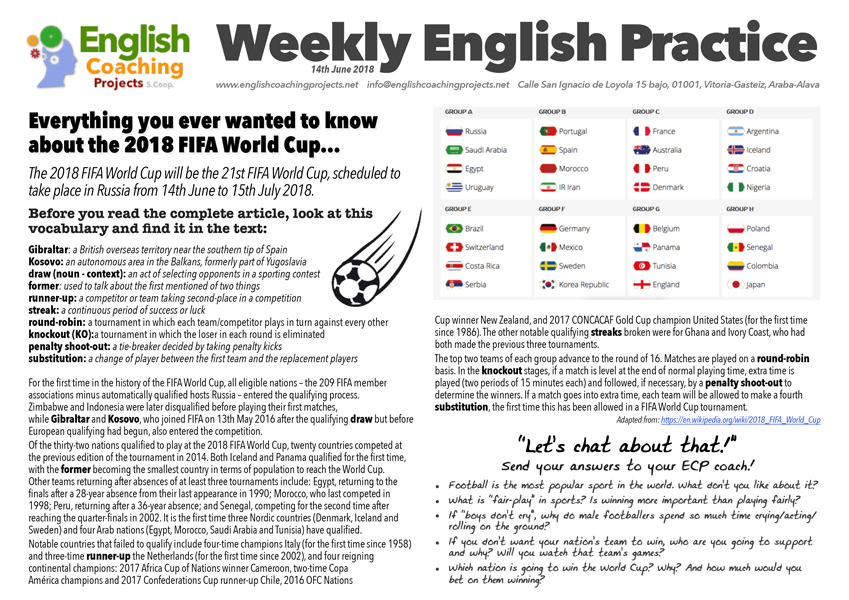Click on the image to download the pdf
The 2018 FIFA World Cup will be the 21st FIFA World Cup, scheduled to take place in Russia from 14th June to 15th July 2018
Before you read the complete article, look at this vocabulary and find it in the text:
Gibraltar: a British overseas territory near the southern tip of Spain
Kosovo: an autonomous area in the Balkans, formerly part of Yugoslavia
draw (noun – context): an act of selecting opponents in a sporting contest
former: used to talk about the first mentioned of two things
runner-up: a competitor or team taking second place in a competition
streak: a continuous period of success or luck
round-robin: a tournament in which each team/competitor plays in turn against every other
knockout (KO): a tournament in which the loser in each round is eliminated
penalty shoot-out: a tie-breaker decided by taking penalty kicks
substitution: a change of player between the first team and the replacement players
Listen to the audio
For the first time in the history of the FIFA World Cup, all eligible nations – the 209 FIFA member associations minus automatically qualified hosts Russia – entered the qualifying process. Zimbabwe and Indonesia were later disqualified before playing their first matches, while Gibraltar and Kosovo, who joined FIFA on 13th May 2016 after the qualifying draw but before European qualifying had begun, also entered the competition.
Of the thirty-two nations qualified to play at the 2018 FIFA World Cup, twenty countries competed at the previous edition of the tournament in 2014. Both Iceland and Panama qualified for the first time, with the former becoming the smallest country in terms of population to reach the World Cup.
Other teams returning after absences of at least three tournaments include: Egypt, returning to the finals after a 28-year absence from their last appearance in 1990; Morocco, who last competed in 1998; Peru, returning after a 36-year absence; and Senegal, competing for the second time after reaching the quarter-finals in 2002. It is the first time three Nordic countries (Denmark, Iceland and Sweden) and four Arab nations (Egypt, Morocco, Saudi Arabia and Tunisia) have qualified.
Notable countries that failed to qualify include four-time champions Italy (for the first time since 1958) and three-time runner-up the Netherlands (for the first time since 2002), and four reigning continental champions: 2017 Africa Cup of Nations winner Cameroon, two-time Copa América champions and 2017 Confederations Cup runner-up Chile, 2016 OFC Nations Cup winner New Zealand, and 2017 CONCACAF Gold Cup champion United States (for the first time since 1986). The other notable qualifying streaks broken were for Ghana and Ivory Coast, who had both made the previous three tournaments.
The top two teams of each group advance to the round of 16. Matches are played on a round-robin basis. In the knockout stages, if a match is level at the end of normal playing time, extra time is played (two periods of 15 minutes each) and followed, if necessary, by a penalty shoot-out to determine the winners. If a match goes into extra time, each team will be allowed to make a fourth substitution, the first time this has been allowed in a FIFA World Cup tournament.
“Let’s chat about that!”
Send your answers to your ECP coach!
- Football is the most popular sport in the world. What don’t you like about it?
- What is “fair-play” in sports? Is winning more important than playing fairly?
- If “boys don’t cry”, why do male footballers spend so much time crying/acting/rolling on the ground?
- If you don’t want your nation’s team to win, who are you going to support and why? Will you watch that team’s games?
- Which nation is going to win the World Cup? Why? And how much would you bet on them winning?
Adapted from: https://en.wikipedia.org/wiki/2018_FIFA_World_Cup


